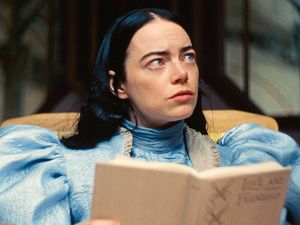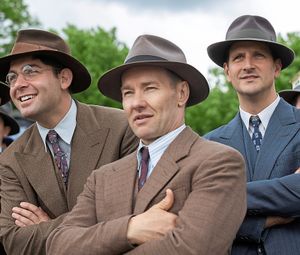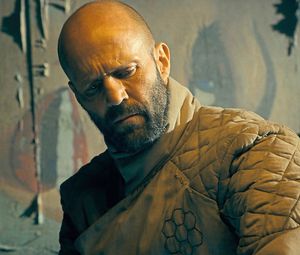Film Talk: No poor things from Emma Stone as bold new black comedy lands
She came into my world with Superbad, and left me in an absolute la la land...

It’s amazing to think, in a way, that Emma Stone has only been part of the Hollywood furniture since 2007. I know, I know, she’s only 35, so how much longer could she have been around? But she always seems like such a level-headed old soul who it is difficult to remember the silver screen without.
This is perhaps in no small part due to the incredible success of her career so far.
After absolutely McLovin’ it in the aforementioned Superbad, Stone went on to smash it in further teen comedies Zombieland and Easy A. But, when 2012 hit so did the undisputed big time, when she stepped into the shoes of Peter Parker’s leading lady, Gwen Stacy, in The Amazing Spider-Man.
After reprising the role for Andrew Garfield’s web slinger’s 2014 sequel, things really started to heat up.
Stone received a supporting actress Oscar nom for her sensational performance in Birdman, and then in fact bagged the Best Actress gong two years later for La La Land.
Since then, she has again been nominated in the Best Supporting Actress category for her turn in The Favourite, and delivered what – until very recently – I considered to be her most captivating performance ever as the scourge of Dalmatian kind herself in Cruella.
But now, the table has been reset.
Those with keen eyes on the industry will know she has already bagged the Golden Globe for this one, but from today audiences can finally catch Stone in the hotly-anticipated Poor Things. It’s not often I give the game away this early, but poor things are the last thing you can expect. Ready? Let’s go...
POOR THINGS (UK 18/ROI 18, 142 mins)
Released: January 12 (UK & Ireland)
An international dream team spearheaded by Greek director Yorgos Lanthimos, Australian screenwriter Tony McNamara, Irish cinematographer Robbie Ryan and American actress Emma Stone reunites after the Oscar-winning glory of The Favourite for a deranged coming-of-age fairy tale that lambasts the treatment of 19th-century women.
Torn from the pages of Alasdair Gray’s novel, Poor Things introduces audiences to a fantastical medical experiment christened Bella Baxter. This unstoppable whirling dervish, portrayed with jaw-dropping gusto by Stone, has been bequeathed life by transplanting the mind of a child into an adult body.
McNamara’s deliciously biting and frequently hilarious script unleashes Bella on a sexually repressed Victorian-era society that believes women should be seen, admired but not heard. Unlike her peers, the film’s exuberant heroine isn’t suffocated by tightly corseted conventions of the period. Bella doesn’t comprehend self-censorship so when the piercing cries of a mewling infant disturb her calm, she doesn’t hesitate to voice her displeasure: “I must punch that baby!”
Stone’s fearless, virtuoso performance defies superlatives.
She uses subtle changes in language fluency, posture and movement to illustrate her character’s white-knuckle joyride from infancy to maturity in artfully staged vignettes of impressive physical and verbal comedy. Full-frontal nudity becomes commonplace by the end credits. Mark Ruffalo demonstrates fine comic timing in support as a hedonistic, moustachioed dandy while Willem Dafoe’s Scottish accent (appropriated from Gray’s book) treks leisurely around the Celtic diaspora.
Production design of gargantuan physical sets is ravishing while Ryan’s inventive camerawork captures lavish costumes in their glory, including sparing use of a fish-eye lens to amp up the wonderful weirdness.
Unorthodox scientist Dr Godwin Baxter (Dafoe) reclaims the near-lifeless body of a pregnant woman, Victoria Blessington (Stone), from a river after she throws herself off a bridge.
The madcap medic christens his Frankenstein-esque creation Bella and charts his ward’s emotional and psychological development including the moment she discovers the art of self-pleasure with the aid of fruit.
“Bella discover happy when she want,” she whoops.
The scientist’s devoted student, Max McCandles (Ramy Youssef), is bewitched by Bella and he assists Baxter in closely monitoring her interactions.
Alas, Bella lavishes her affection on rakish lawyer Duncan Wedderburn (Ruffalo) and he spirits her away on a globe-trotting adventure, far removed from Baxter’s tender care. Poor Things is tightly handcuffed to Stone’s extraordinary performance. She commits ferociously and wholeheartedly to her portrayal of wide-eyed innocence and richly deserves to join an elite club of two-time Oscar winners. Lanthimos’s impeccably furnished ship feels a little rudderless in the middle hour when Bella and Duncan take to the high seas but after the characters make land again, narrative thrust increases.
Brilliantly and breathlessly bonkers but not for the faint of heart.
THE BOYS IN THE BOAT (UK 12A/ROI 12A, 124 mins)
Released: January 12 (UK & Ireland)

A rousing true story of Depression-era underdogs pulling together as a rowing team for a shot at glory at the 1936 Summer Olympics in Berlin is ambrosia for an emotionally led director like George Clooney.
Based on Daniel James Brown’s book, The Boys In The Boat is an unabashedly old-fashioned drama of triumph against overwhelming odds that luxuriates in chocolate box images of perfectly synchronised oars scything through rippling water bathed in golden sun.
The physically and mentally gruelling sport of rowing isn’t obviously cinematic.
Blistered hands and a broken oar feel somehow underpowered next to a slow-motion knockout punch in a boxing ring, a last-gasp goal or touchdown on a football pitch or a jockey winning by a nose in the final furlong. Clooney and editor Tanya Swerling work hard to energise sequences on the water, capturing sweat-slathered exertions of a strapping ensemble cast led by London-born Callum Turner as a motherless loner, who is abandoned by his father at the age of 14 for a new family, and schools himself to be self-reliant.
It’s sink or swim and Turner’s stoic character does the latter, providing an instantly endearing focal point on which screenwriter Mark L Smith can hang touching scenes of self-empowerment, a flimsy romantic subplot and some heavy-handed class warfare.
The Depression bites hard in 1936 Seattle, Washington, and 22-year-old Joe Rantz (Turner) lives hand to mouth in a burnt-out car while he studies engineering at the University of Washington alongside classmate Roger Morris (Sam Strike) and childhood crush Joyce Simdars (Hadley Robinson).
With a two-week deadline to pay his outstanding tuition fees, Joe responds to an advert promising free lodging and part-time employment to any young man who wins a coveted spot on the university’s rowing team under Coach Al Ulbrickson (Joel Edgerton) and his deputies, coaches Bolles (James Wolk) and Brown (Dominic Tighe).
Desperation propels Joe to the brink of physical exhaustion and he secures seat two in the junior boat with Roger at the bow and bombastic cox Bobby Moch (Luke Slattery) barking orders at the stern. Eyes quickly turn to the forthcoming Poughkeepsie Regatta which determines the university boat that will proudly represent Team USA at the impending Olympics. The Boys In The Boat maintains a steady stroke rate as young dreamers are whipped into shape with a conventional training montage before they draw strength from fraternal bonds to power through viral infection and self-doubt. Thinly written female characters exist solely to support men’s sporting ambitions and cheer from the sidelines.
Clooney hits each predictable emotional beat and he builds to a grandstand finish that advocates loudly for guts and brawn to overcome privilege and fascism by the finish line.
THE BEEKEEPER (UK 15/ROI 15A, 105 mins)
Released: January 12 (UK & Ireland)

Revenge is served ice cold with a flurry of fists in a propulsive action thriller directed by David Ayer from a script penned by Kurt Wimmer.
Mr Clay (Jason Statham) enjoys a simple, uncluttered life in the countryside, far removed from his shadowy past as an operative of a powerful and clandestine organisation known as the Beekeepers.
His neighbour Mrs Parker (Phylicia Rashad) is a trusted friend and he looks upon her as family. She falls victim to a phishing scam, which steals her life savings and drives Mrs Parker to suicide.
Utilising his elite skill set, Clay vows revenge against the company responsible for the swindle and he burns the offices to the ground. The company’s CEO, Wallace Westwyld (Jeremy Irons), recognises the serious threat that one man poses.





